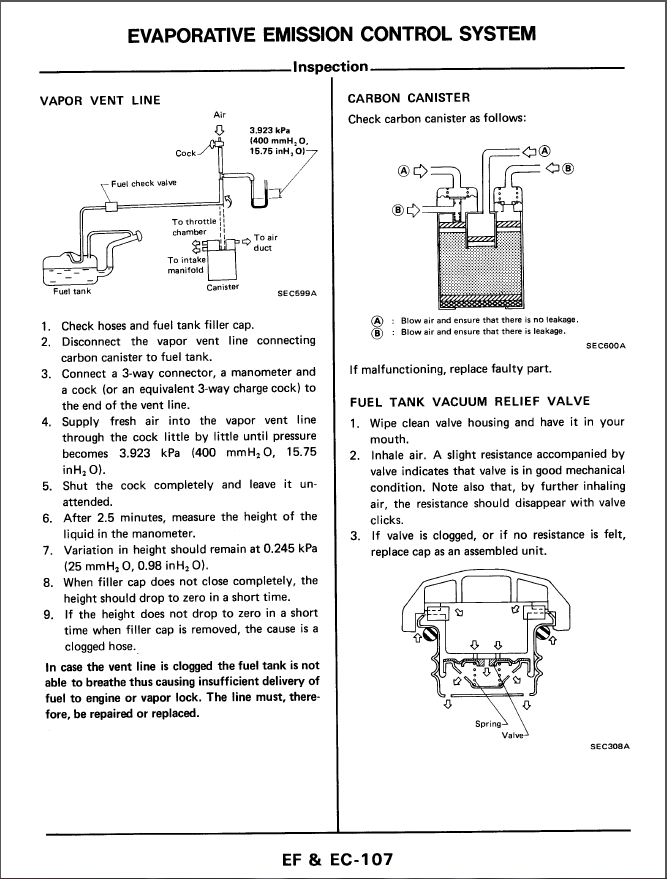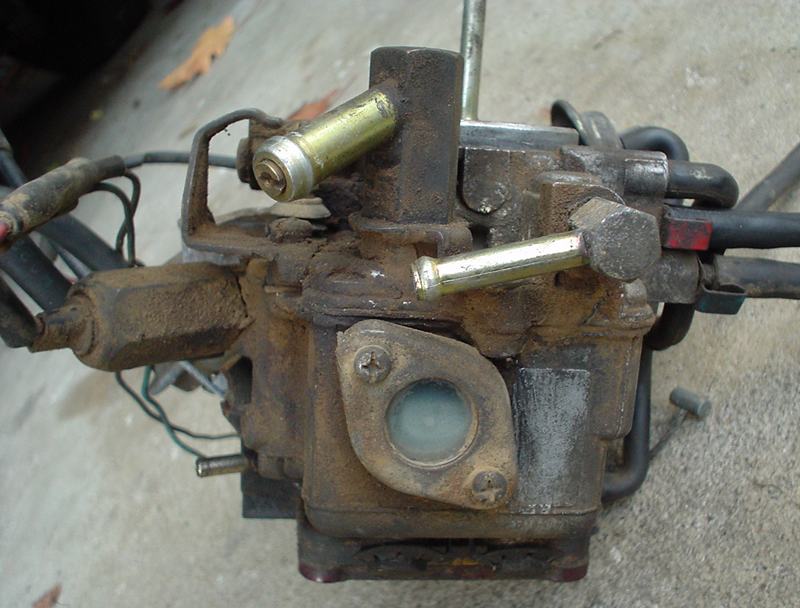Late-model Australian utes were also fitted with a carbon canister, as seen in this 1985 model:
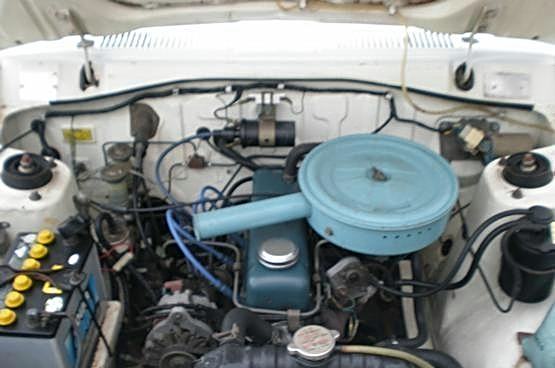
Contents |
Overview
The Carbon Canister (Vapor Canister) was fitted firstly to 1975 USA B210 to capture fumes from the fuel tank. Instead of letting the fumes just to go the atmosphere. In the Canister is an activated charcoal filter, hence its common name charcoal canister. Later when the engine runs, fresh air is drawn through the filter and burned in the engine. Like all 1200s, the fuel tank Filler Cap is not vented. It seals the gas tank well, so that any fumes must go through the vent hose. In the case of EVAPO models, the tank is vented in the engine compartment through a steel Evaporative Fuel Line. Bottom line: makes your Sunny smell good!
Some late-model 1200s (as well as some B210 and B310 Sunny models) used a carbon canister, which was fixed by a bracket, bolted to the left strut tower. This is what most modern automobiles use to contain and filter the fumes created by the fuel (evaporative emissions). Instead of a Flow Guide Valve, the fuel tank is vented via the carbon canister. A simple check valve is used (located near the fuel tank) to prevent backflow into the fuel tank.
All late-model 1200 Sunny Trucks (from October 1989) were fitted with a carbon canister.
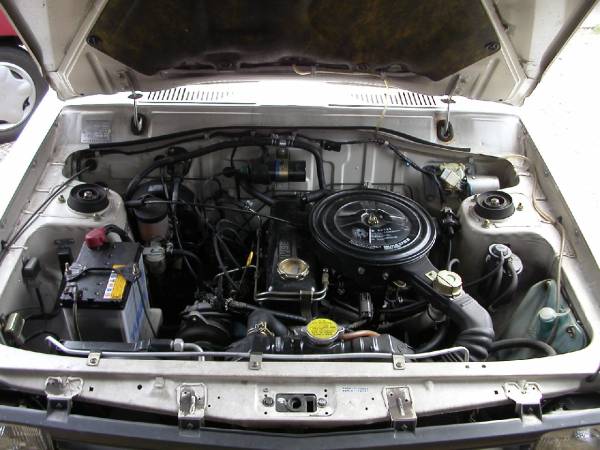

Late-model Australian utes were also fitted with a carbon canister, as seen in this 1985 model:

All USA B210s, from 1975 onward, were fitted with a carbon canister.
Australian A15-powered B310 Wagon (all other Aussie B310s implemented a Flow Guide Valve).
This system does not make use of a Flow Guide Valve. Instead, when the engine is running, the fumes are drawn through the air cleaner. When the engine is not running, they are stored inside the canister, where they are then absorbed by the carbon. When the engine is started, the purge line draws air through the canister and into the engine, thus drawing the fumes into the engine.
Maintenance
The carbon filter should be replaced at the interval listed in your owner's manual (generally every 2 year or 40,000 km).
System Operation
The canister is bolted to the left strut tower (right side of this photo)


The fuel tank is vented to the carbon canister, via the Evaporative Fuel Line (fuel tank vent line), as seen in this diagram:
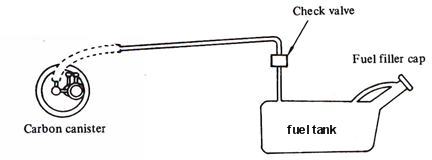
The 1.5-way check valve allows fresh air to freely enter the fuel tank, but only a partial amount of the fumes from the fuel tank can re-enter the engine compartment.
The canister has three lines, as shown:
- Purge line, to the intake manifold.
- Control line, to the Vacuum Advance port on the carburetor (tee'd into the existing hose).
- Vent line, to the fuel tank, which also includes the Fuel Check Valve (1.5-way valve).
4-hose Canister
The 4-hose canister (like this 1986 Nissan unit) uses a sealed tank, like every other canister system. The FSM refers to a "Fuel Tank Vacuum Relief Valve", which is the fuel tank cap. The cap is sealed (no vapor can escape through the cap), so vapor will exit via the fuel tank vent line.
The vapor from the tank goes through the vent line to the Charcoal Canister.
- If the engine is off, the vapors are stored in the activated charcoal
- When the engine is running, the vapors are routed into the engine
When the tank pressure drops, air is admitted to the bottom of the Canister, and into the tank. The tank check valve (in the vapor line) won't admit pressure to the tank, but will allow fresh air back in.
S13 Canister
Nissan S13 (Silvia) uses a standard 3-hose Canister (three hoses on top). Additionally, it has a large hose connection on the bottom of the Canister. This is the fresh air inlet. Older Canister were open to the air at the bottom, but new ones have a hose so that the inlet can be routed somewhere else.
5-hose Canister
Most 1981 North American B310s used a DCH306 version 2.0 carburetor, which has a vented fuel bowl.
This externally vented fuel bowl goes to a special 5-hose canister. This canister has a Vent Switching Valve that is open when the engine is not running, to allow vapor from the fuel bowl to directly enter the carbon filter. When the engine is started, the resulting vacuum in the intake manifold causes the Vent Switching Valve to close, and the fuel bowl subsequently vents as previous - through the vent located above the choke blade.
4th & 5th hoses Fuel bowl vent line (large diameter) Vacuum, from intake manifold (small diameter)
Used by: * All USA models. * Canada MPG model.
Part Numbers
14950-50A21 EVAPORATION CANISTER ASSEMBLY [4-line] JAPAN * B120 8910- A12 * C23 "Vanette" GA16DE
14950-W5901 VAPOR CANISTER ASSEMBLY <> 14950-S3001 <> 14950-N5300/14950-N5301 $137 USD USA * 1975-1978 B210 USA * 1980 N10 "310" USA JAPAN * 8110-8404 B11.E15E * 8205 N12.E15E
14950-H9160 USA * 1979-1980 B310 A14/A15 + A12.CAN * 1979 N10
14950-H9500 USA * 1981-1982 B310
14950-M6660 <> 14950-H9911 USA * B310 A12.CAL * N10 1980-1982 A14,A15,E15 * S12 "200SX" 1984- CA18ET
14950-H9900 [3-line] USA * 1980 B310 "210" A12.FED * 1983-1984 N12 "Pulsar" E15ET JAPAN * 8209-8404 B11.E15ET * 8305- N12.E15T
Filter
14952-N5300 FILTER $8.50 USD Luber-Liner AF63 $2 USD JAPAN * K10 "March", 910, B11,BK10,C120,C31,E23,M10,N12,PK10,S110,T11,U11 NORTH AMERICA * B210 * B310 "210" * 720/D21 Pickup * B11/B12 Sentra * KN13 Pulsar NX * M10 Stanza Wagon * N10/N12 310 Pulsar * S110/S12/S13 200SX 240SX * T11/T12 Stanza Fram BA3865 $2 USD * GM 07021743 * 1989-1992 Century/Cutlass/6000/Celebrity 4-cylinder
14964-F1700 CAP [with single vacuum fitting] * B210 * B310 "210" * 720 "Pickup" except Z24 * N10 "310" A14/A15 * S110 "200SX" * S130 "280Z" 1979 * T11 "Stanza"
14952-F1700 FILTER SIX CYLINDER * S30 "280Z" * Z31/Z32 "300ZX" * 910 "810/Maxima" * S12 "200SX" VG30E * U11 "Maxima" AcDelco A478C

![[Datsun 1200 encyclopedia]](/wiki/upload/wiki.png)


